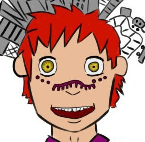 New link in the top of page "IRC Chat". |
| Register | Login | |||||
|
Main
| Memberlist
| Active users
| Calendar
| Last Posts
| IRC Chat
| Online users Ranks | FAQ | XPW | Stats | Color Chart | Photo album |
|
| | |||
 New link in the top of page "IRC Chat". |
| Register | Login | |||||
|
Main
| Memberlist
| Active users
| Calendar
| Last Posts
| IRC Chat
| Online users Ranks | FAQ | XPW | Stats | Color Chart | Photo album |
|
| | |||
| 0 users currently in Muses' Sanctuary. |
| Xeogaming Forums - Muses' Sanctuary - Parasites |
 | |  | |  |
| Next newer thread | Next older thread |
| User | Post | ||
Phoenixocracy The one true Xeodent  Since: 01-08-10 From: Xeomerica Since last post: 2131 days Last activity: 2131 days |
| ||
| Hahaha. This is just an essay I wrote. Its not any story or anything--I dont really share them. But I had fun writing this. Dont complain if its not good, I wrote it from two to five in the morning.
It’s a Parasitic World Parasite. At the mention of the word, your skin begins to crawl as you scratch it in discomfort. You picture a spider-like monster with demonic claws and jagged teeth charging directly at you. But what exactly is a parasite? By definition, a parasite is something that lives off of another. Doctors even use the term incorrectly at times, classifying some diseases as parasites and others not. Technically speaking, every disease we carry in our bodies is a parasite, but are they all bad? So, clasp your hands behind that lice-infected hair and give those teeth amoeba something to chew on as we delve deep into their world. Now, most people believe all parasites to be tiny, microscopic creatures that crawl all over our skin. While that may be the case for most, it’s not always true. The first parasite we are going to look at is the tapeworm. Humans and tapeworms have been very close for approximately 1.7 million years. They’ve been around for quite a long time, and they aren’t going anywhere any time soon—especially with those hooks they use to latch onto your intestines. Surprisingly enough, these parasites have no digestive tract, though. Instead, they absorb partially digested food from within the intestines. But tapeworms don’t just infect humans. The human species received tapeworms from hunting and eating meat like the large cats around them. The tapeworm will latch itself onto the intestinal wall with the hooks in its mouth and make itself a home there. It will gradually grow longer, ranging from six inches to twenty-six feet long. After the tapeworm reproduces, its eggs detach themselves from the body of the adult tapeworm and travel throughout the bloodstream. There are two main ways that they are spread. The first is by a bowel movement of the animal. The embryos exit the body along with the fecal waste and quickly find a source of water to swim in. From there, the tapeworm waits for another animal to get thirsty and—slurp!—down goes the baby tapeworm. Another means of exit that the tapeworm uses is very clever. The small tapeworms will burrow their way through the abdominal lining upon birth and into the arteries—the highway through the body. Once in the bloodstream, the tapeworms look for a nice, warm muscle or organ to relax in. They burrow themselves into the organ and curl up into a small ball. They then form a liquid filled sack around themselves, forming a cyst in which the tapeworm lives. The parasite then waits patiently for their host’s murder. A hunter will come along and kill the infected animal, consuming the dead flesh along with the puss filled cyst containing the tapeworm. From there on, the cycle continues. Parasites are extremely intelligent creatures. They haven’t survived in our bodies for thousands of years just by luck, after all. The next parasite may seem like a joke to you, but don’t think that around it—it may here you. That’s because the parasite known as cordyceps is a mind controller. Literally. Luckily for us, it only infects insects and other fungi so far. But be on the lookout, cordyceps will reign powerful. Although cordyceps is fungus, this super-powered monster is a parasite by definition. Cordyceps enters its host’s body and begins to spread. It will feed on the host’s insides, slowly replacing the tissue as it grows. When the fungus is almost ready to sprout, it will act. It takes over the mind of the ant, for instance, and has them walk away from the rest of the colony. It will then have the host climb up very high above the rest of the colony on a branch of a tree or a leaf on a plant. From there, the ant latches onto the plant with its mandibles to steady itself—just where the parasite wants to be. It will take between three to ten days for the fungus to fully grow out of the ant’s body and into a protruding plant, but when it does, the process repeats. The fungus will start to spray spores high above the colony to fall down and infect the rest of the insects. Talk about brain food. As far as cordyceps go, each species of the parasite infects only one species of insects. They strike and lower the population of insects, keeping everything nice and balanced. No one insects reigns supreme, either, as all of them have their very own mind controller. Another mind control parasite infects not insects, but birds. Leucochloridium paradoxum is a worm-like parasite found in bird feces. When the feces lands down below, many small animal and bugs come along to eat it, with one guiltier than the others. I am talking, of course, of the infamous snail. The snail, for some reason, enjoys the taste of bird droppings, not that the parasite’ complaining. On the contrary, this mind controlling worm wants the snail to consume the feces in which it is held. Once it enters the snail’s body, the growing begins. Instead of making more room for itself within the snail’s body, this worm just grows its way right into the eyestalks of the snail. After a while, the worm becomes visible through the translucent skin of the snail. After it gets into the eyestalks, the worm then takes over the mind of the snail. It has its host crawl from the safety of the underbrush and into the wide open. At this point, the eyes of the snail look like wriggling maggots or caterpillars—a bird’s favorite. An unsuspecting bird swoops down to what it thinks is a well-balanced meal and pecks off the eyes of the snail. The parasite is successfully transferred into the bird yet again, and the cycle repeats. The next worm goes by the name of the guinea worm. This parasite starts its infestation through water. When the host downs the parasite filled water, it takes the free ride don into the stomach and through the intestines. Once in the intestines, the worms reproduce. The males die directly after conception, leaving the women worms to stick around and ‘clean’ the place up. After a while the females decide that they want to lay eggs. Naturally, this means burrowing its way out of your intestines, down your thigh and into your lower leg, where it digs its way out of skin just enough to protrude and lay eggs. The wound hurts, of course. It’s a stinging, heated feeling, making the host want to plunge their aching foot into a body of water. Which is just what the parasites want. Once in the water, they can lay their eggs and begin the process over again. As gruesome and maniacal as parasites are, they aren’t bad. Without parasites, things would be much different in the world we live in today. The human body has changed and adapted to parasites over the course of years they’ve been around—we almost need them at this point. Without them, our bodies attack themselves—literally. Our immune systems have grown so ready for parasites that they stand guard 24/7. They fight the parasites inside of us and take them out. Without them, our immune systems become antsy. It’s like they develop ADHD and start acting up. They start attacking everything that enters our stomach, regardless of whether or not it has something in it. When it finds nothing, our immune systems start attacking our bodies. This is called Krohn’s disease. So you see, this parasitic world that surrounds us is a marvelous thing. It helps the eco-system by getting rid of over-populous animals, or they just brush our teeth for us when we’re sitting around doing nothing. So go eat some raw meat, or don’t wash your hands after going to the bathroom. Parasites are great. After all, aren’t we all just parasites on this host we call earth? |
|||
Elara Divine Mamkute Dark Elf Goddess Chaos Imp Penguins Fan Ms. Invisable  Since: 08-15-04 From: Ferelden Since last post: 535 days Last activity: 535 days |
| ||
| A very interesting look at parasites, and informative as well. What class was this for? | |||
Phoenixocracy The one true Xeodent  Since: 01-08-10 From: Xeomerica Since last post: 2131 days Last activity: 2131 days |
| ||
English 12. My teacher disliked that I wrote informally, but I hate writing formal. It's too boring. I still got an A because he liked it, but yeah. I forget why I chose parasites, but I had a alot of fun. I skeeved myself out, though, because now I know what crawls all over my body at any given moment.   |
|||
Elara Divine Mamkute Dark Elf Goddess Chaos Imp Penguins Fan Ms. Invisable  Since: 08-15-04 From: Ferelden Since last post: 535 days Last activity: 535 days |
| ||
| Well, lucky you. You are going to have to write formally in college, unless you get some really cool teachers, I warn you now. It isn't that hard really, once you get the hang of it. If all else fails there are usually writer's workshops to help you take an informal paper and edit it to be formal.
But yeah, I've been thinking about tapeworms all day because of you now. *glare* |
|||
Phoenixocracy The one true Xeodent  Since: 01-08-10 From: Xeomerica Since last post: 2131 days Last activity: 2131 days |
| ||
Hahaha. I apologize. It's unsettling, isn't it? To think something may be crawling around your insides waiting for you to eat, and then hatching eggs to be taken elsewhere by your excrements? Disgusting, but very interesting.  (Last edited by Phoenix on 06-30-10 03:12 AM) |
| Next newer thread | Next older thread |
| Xeogaming Forums - Muses' Sanctuary - Parasites |
 | |  |
